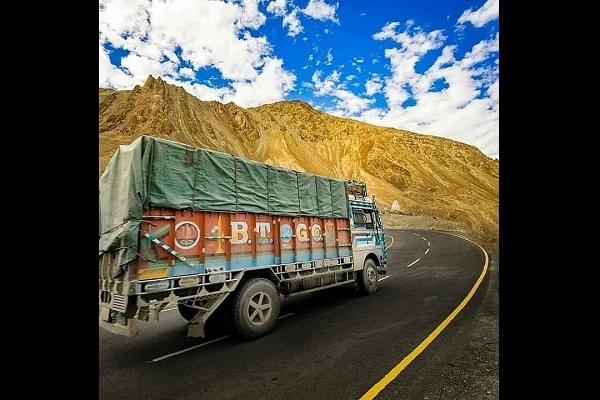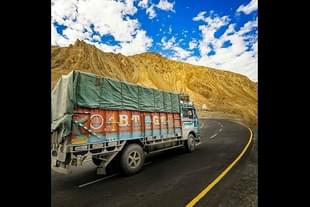News Brief
Explained: How Government-Owned Indian Oil’s New Diesel Is A Big Relief For Ladakh’s Winter Transport
Swarajya Staff
Nov 19, 2019, 11:30 AM | Updated 11:30 AM IST
Save & read from anywhere!
Bookmark stories for easy access on any device or the Swarajya app.


High-altitude regions like Ladakh experience a unique problem in the winter months. When temperature goes down as far as minus 30 degree Celsius, the people experience freezing of diesel in their vehicles.
To address this problem, Indian Oil Corporation Limited (IOCL) has developed a winter-grade diesel that doesn’t lose its fluidity even in extreme winter conditions. The winter-grade diesel, developed by IOCL's Panipat refinery, is usable up to minus 33 degree Celsius.
On Sunday (17 November), Home Minister Amit Shah launched the supply of special winter-grade diesel for high altitude Ladakh, which faces sub-zero temperatures during the winter months.
Union minister for petroleum and natural gas Dharmendra Pradhan and BJP MP from Ladakh Jamyang Tsering Namgyal were also present during the launch.
What happens to diesel in winter?
In cold weather, diesel fuel is prone to waxing or gelling - in which particles start to crystallise. Below a certain temperature, called Cloud Point, the wax in the diesel starts to solidify giving it a cloudy appearance. The solidified waxes clogs the fuel filters and injectors in engines.
It is important to note that the freezing point of the petrol is much lower than that of the diesel at minus 60 degree Celsius, but former is costlier.
One might have noticed that in cold weather, often the vehicles take longer than usual to start. This might be due to partial solidification of the fuel. However, once the diesel motor is started it continues to operate at temperatures below the CFPP.
The engine warms up eventually, and in turn warms the excess fuel from the injector pump and injectors which is returned to the fuel tank. This warmth helps in reversing gelling in the tank.
Due to this, the truck drivers in the extreme cold conditions often leave the engine idling - leading to fuel wastage and increased pollution.
The minimum temperature in which the oil has the ability to pour down from a beaker is called the Pour Point, below this temperature a liquid loses its flow characteristics. For diesels, however, other metrics are used which are slightly above the Pour Point.
One such metric is Cold Filter Plugging Point (CFPP). It indicates the rate at which diesel fuel will flow through a standardised filtration device in given time when cooled.
What is winter-grade diesel?
There are several ways to allow diesel engines to continue to operate in cold weather conditions.
One is to use electric heaters in fuel tanks and around fuel lines. This would require a design change. This is the standard equipment in vehicles that operate in arctic weather conditions.
A number of additives are also marketed that lower the CFPP of diesel oil. They have to be mixed with the oil. The additive does not prevent the development of wax particles but their melding together to form larger wax flakes that can cause clogging.
For additive to be well mixed with the oil and be effective, the oil needs to be above the Cloud Point temperature.
The third option is blending. Here, the vehicle-owner is saved from the trouble of finding a suitable additive and adding it at a suitable temperature. The blended diesel is enhanced to prevent it from gelling in cold weather conditions.
The Indian Army also currently uses special grade fuel and oil in high altitude areas. However, it is also mulling hybrid vehicles with dual power source, as the engine horse power of conventional vehicles drops considerably in high altitude areas due to lack of air density and pressure.
The benefits
Not only the IOCL’s winter grade diesel can survive harsh winter but it also meets BIS specification of BS-VI grade diesel, and therefore, will be less polluting in the mountainous regions.
Oil Minister Dharmendra Pradhan said Ladakh will now get uninterrupted supply of special winter-grade diesel, which will help reduce the hardships faced by the local people for transportation and mobility during the harsh winter months.
This will further facilitate the local economy as well as tourism of the region, Pradhan was quoted as saying by Livemint, adding that all diesel taxi vehicles in Ladakh stop working in the winter season as diesel gets frozen but now people can use winter-grade diesel.
The first tank truck containing the winter-grade diesel has been flagged off from Panipat in Haryana for Jalandhar. From there, the fuel will be transported to Ladakh to ensure regular availability of the product in the highest altitude petrol pumps.
IOCL said that it transports nearly 10 crore litres of petroleum products in a short span of just 5 months to the union territory for advanced winter stocking.
“This ensures round-the-year availability of fuel supplies despite the closure of roads for nearly six months in severe weather conditions," it said.
In a tweet, Ladakh MP Jamyang Tsering Namgyal said that the new diesel will save locals from spending sleepless nights in igniting and keeping the engines warm all night.
“Welcome step for fighting off the difficult winter conditions along with maintaining the standards of sustainable fuel,” he said.





